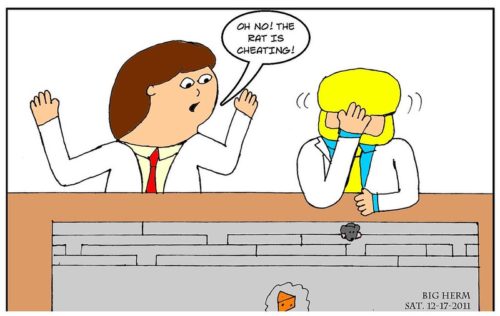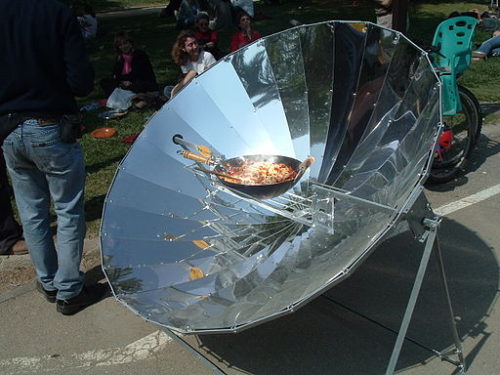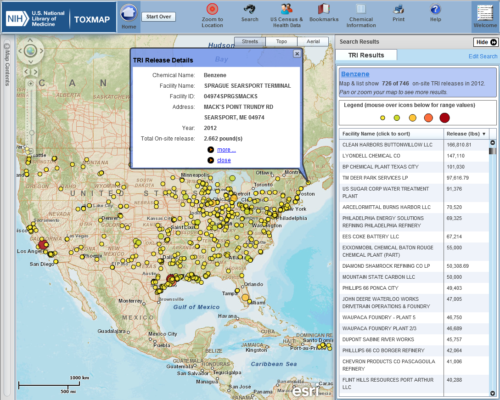Kiss me, I'm a scientist
Maria Rodriguez ·By: Maria Rodriguez
This week we are talking about Science, Technology, and Society. This discipline, which explores the relationship between science and technology and their social context, was developed in the 1970s, and originally evolved from the field of Laboratory Studies. To understand better this concept, we read a book chapter from Handbook of science and technology studies, written by Dr. Karin Knorr Cetina.1 The Laboratory Studies approach analyzes the process of knowledge production and the influence of society and culture in the creation of science. Laboratory Studies scholars try to demystify the laboratory as an isolated, aseptic place where extravagant people (called scientists) study complicated things that no one else understands. This cliché has been largely presented in literature, movies, and TV shows, wherein scientists are presented as people without emotions who analyze every aspect of life through scientific theories and models. Even though I love some of these shows, I have to say that not all scientists are like Sheldon Cooper!!

Laboratory Studies is a “constructivist” approach. Constructivism postulates that science is a construction of facts and that scientists "construct" science by making decisions. For example, they choose which natural object to study and the methods and equipment that should be used, and they interpret the results of the experiments. Some of these decisions are influenced by their context, availability of materials, availability of funds, and organizational structures. Some classmates expressed their concerns about constructivism. If science is constructed, is it not neutral? Is it not pure? Is it biased? As Dr. Nicole Mogul, our guest lecturer and assistant director of the Science, Technology and Society Program at UMD, explained, the answer is no. Science is real; results of experiments are real. International standards have been established as a minimum set of rules to follow. These standards allow for the comparison of scientific results between laboratories and countries.

Science is developed by human beings: scientists. Scientists are not robots— we are people, too. Like every other human, each scientist was raised in a specific moment of history, in a specific country, in a specific culture, and this socio-cultural context influences our way of thinking and behaving. In a previous lecture, we read Dr. William Cronon's work, Uncommon Ground: Rethinking the Human Place in Nature.2 In that work, Cronon highlighted the relationship between culture and nature: nature is defined by humans, and humans are always influenced by culture. That is why nature and culture cannot be considered separately.
The same reasoning can be applied in the case of science. Culture influences science and the places where science is produced (laboratories) in many ways. Knorr Cetina's paper mentions the differences between organizational practices of laboratories in the United States and Japan. Our professors also mentioned different structures of universities in Germany and the United Kingdom. Culture does not only influence organizational structure in work environments, such as laboratories and universities. Dr. Erin Meyer's book, The Culture Map, describes cultural differences in ways of communicating, disagreeing, trusting, making decisions, even scheduling activities.3 Laboratories are permeable, and are not only are influenced by culture and society, but they can also influence society. Constructivists studied such changes in society after Pasteur's discovery of penicillin. There were changes in food processing and people's hygiene. We can also see changes in society after scientific discoveries nowadays. For example, after some scientific reports about adverse health effects of sugar were released and published by the media, sales of soda decreased twenty percent from 2007 to 2017 in the US.4
Another aspect of the field of Science, Technology and Society that we discussed was the concept of appropriate technology. I heard of this term for first time when I was invited to a solar barbecue hosted by Engineers Without Borders in Spain a long time ago. I was very intrigued by this event, which was held on the roof of a building at the University of Valladolid, my alma mater. When I arrived on the roof, I could see a giant satellite dish. It was a solar grill. The purpose of this event was to raise funds for the installation of solar kitchens in an African country. In this country, women traditionally burned wood as fuel for cooking; however, they had to walk long distances to find wood and suffered from respiratory problems because of the smoke. The Engineers Without Borders project intended to substitute the wood-fired kitchens with solar kitchens. They defined solar kitchen as an "appropriate technology".

The concept of appropriate technology appeared in the 1960s, and describes a technology designed to adapt to local practices and materials. This technology should be sustainable, environmentally friendly, energy efficient, and not dependent on external materials or support. The concept was applied mostly in developing countries. After the solar barbecue, I became a member of Engineers Without Borders and attended many conferences about appropriate technologies. I witnessed passionate debates about this concept, especially after the arrival of new technologies to developing countries. Some people argued that information technologies should not be considered to be appropriate technologies because they need hardware and electricity to work. How can communities in developing countries fix a computer when it breaks if they do not have access to adequate materials or training? Participants of such debates were trying to define technologies appropriate for everyone in every developing country. They forgot one of the main principles of appropriate technologies: the locality. Technologies are appropriate when they fit local context. They can be locally appropriate and do not necessarily need to be appropriate worldwide.
In recent years, the appropriate technology concept has evolved to "open source appropriate technology" in order to incorporate the information technologies. This term is used in both developing and developed countries. To more deeply investigate this concept, we read the paper "Environmental information systems as appropriate technology" by Dr. Kim Fortun.5 In this paper, the author describes an interactive website called Scorecard, which shows profiles of chemical pollutants. Fortun describes this website as an appropriate technology. The Scorecard website allows users to customize reports, share information about chemical pollution, and communicate with the Environmental Protection Agency (EPA). Fortun asserts that the design of the website matches the material, political, and technological context where it is used, and therefore should be considered an appropriate technology.
The Scorecard design has been criticized because of its complexity and trust issues with the data source (the Toxic Release Inventory of EPA). Nevertheless, the website has good attributes, like the consolidation of a high amount of data, the facilitation of collaboration among people who live in disperse areas of a world with transnational environmental issues, and the provision of scientific information that increases science literacy and helps consumers make informed decisions. The Scorecard design aims to accomplish a higher purpose, namely the achievement of human rights related to a healthy environment.

Another topic of discussion in our class was the right to know. In the internet era, privacy has become a big concern. Our professors mentioned that different cultures have different concepts of privacy. What kind of information should be shared? How should this information be released? Knowledge is power, as Sir Francis Bacon said. Scientists produce knowledge and therefor have the power, but this knowledge can be inconvenient for some economic and political actors. As a result, the release of information can be risky. Our classmate, Alison Thieme shared an article about the imprisonment of a Turkish scientist because he released a report about health risks without the government's permission.6 This is not the only case of scientists running into problems because of their research. According to a study from the Brennan Center for Justice, science made by governmental institutions has become politicized and many scientists, especially climate scientists, have been threatened, reassigned, or have had their budgets reduced.7 Science can be a risky career nowadays, especially for scientists studying environmental issues and their health effects.
Amnesty International declared that scientists have a duty to release information related to public health, and that this type of information release is protected under the right to freedom of expression. What do you think about our right to know or our duty to inform?
References:
1. Cetina, K. (1995). Laboratory studies: the cultural approach to the study of science. In Jasanoff, S., Markle, G. E., Peterson, J. C., & Pinch, T. Handbook of science and technology studies (pp. 140-166). : SAGE Publications, Inc. doi: 10.4135/9781412990127
2. Cronon, W. (1996). Uncommon ground: Rethinking the human place in nature. New York: W.W. Norton & Co.
3. Meyer, E. (2014). The culture map: Breaking through the invisible boundaries of global business.
4. The New York Times (2015). The decline of “big soda”.
5. K. Fortun, "Environmental Information Systems as Appropriate Technology," in Design Issues, vol. 20, no. 3, pp. 54-65, July 2004.
doi: 10.1162/0747936041423217.
6. Big Think (2019). Turkish scientist sentenced to 15-months in jail for publishing environmental study.
7. Brennan Center for Justice (2019). Proposals for Reform Volume II: National Task Force on Rule of Law & Democracy.
Next Post > Kicking off another semester of Environment and Society
Comments
-
Kayle Krieg 6 years ago
I loved your personal story of appropriate technology and the Engineers without borders. Inquiring minds DO want to know, how was the paella? Concerning the "right to know" of information, I agree that this data should be widely available, especially those who could be harmed by not knowing. I do worry about the potential misuse and misunderstanding of data, for instance, when people do not understand the difference between chemical compounds (e.g. thimerosal v methyl mercury in flu vaccines). All we can do is our best to make sure facts (not alternative ones) are focused on in public spaces.
-
Enid 6 years ago
Wow! I'm absolutely mind-blown by the solar barbecue. I'd love to have one of these to go camping! Great job with your explanation of the lectures in class, especially the Knorr Cetina. I had trouble in class following her discussion, but your writing cleared a few ideas. Thanks for that! Great job!
-
Hamani Wilson 6 years ago
When it comes to equity in science and technology, the concept of solar energy is a great case study. Its interesting because people aren't able to control and manipulate it as a resource in ways that land and the water are. As you mentioned, The Engineers Without Borders project intended to substitute the wood-fired kitchens with solar kitchens is a great demonstration of how people at lower socioeconomic levels can take advantage of its benefits.
-
Amanda Rockler 6 years ago
Great synopsis of the readings and lecture. I like the link to Cronon's work and I am interested in the Culture Map book. I had not made a full connection to "appropriate" technology until you highlighted the solar kitchen example. I was part of a project team in Afghanistan working with women on agriculture extension and we used tons of "appropriate" technologies, but I had never thought of it through that lens, so thanks!
-
Andrea Maria Miralles-Barboza 6 years ago
How was the solar paella??
-
Isabel Sullivan 6 years ago
I love the title! I also love how you explain that scientists are people too. I think many people view scientists as other beings that they are unsure how to interact with. The solar oven as an appropriate technology really got me thinking about advances that aren't always seen as appropriate technology but can be.
-
Michael J. Paolisso 6 years ago
I also like the title. The cartoon are great. I am curious to check out the "Culture Mapping" book. I really enjoyed the expanded discussion on appropriate technology and how you brought in your own engagement with Engineers without Borders. Thanks.
-
Taylor Gedeon 6 years ago
The concept of 'the right to know' is something I always struggle with. I broadly think that any data that cannot be used in a harmful way should be released to the public. But how do we decide this? On a case-by-case basis? I do think the general population has a right to know about all of the potential pollutants around them that could affect their health. Ex: lead water pipes
Also would like to know how the solar paella was..
-
Alison Thieme 6 years ago
I think we have a right to know about things in our local environment that can potentially harm us and that our duty to inform is similar. My hope is that funding sources allocate a portion of their grants to outreach and communication so what scientists share is easily understood and easily accessed.
-
Dan DeBaun 6 years ago
Thanks for the reference to Scorecard. We use it often and recommend it to our berkey water filter users who are trying to get a grasp on how much they may be affected by toxins in their town.

